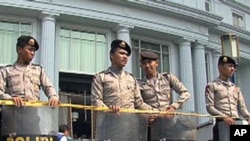Terrorism tied to Islamic fundamentalism seems to be on the rise in many parts of world -- from Yemen and Pakistan to southern Thailand and the Philippine island of Mindanao. But, in Indonesia -- a country that security experts worried might become a base for training and exporting al-Qaida recruits -- terrorism has declined in the last five years. The Indonesian government has taken a soft approach to terrorism, treating it as a crime and and not a war. And this approach seems to be working.
In July 2009, suicide bombers linked to Jemaah Islamiyah (The Islamic Group), an Indonesian organization affiliated with al-Qaida, detonated explosives in two Western hotels in Jakarta, killing nine people and injuring more than 50 others.
The deadly bombing was a reminder that terrorism remains a threat, but this was also the first deadly attack in two years.
Analyst Sidney Jones says terrorism in Indonesia is on the decline in part because political and social conditions in the country are stable. "We don't have a repressive government. The country is not under occupation. We don't have an alienated minority," Jones said. "And, we don't have any hostile neighbors stirring up trouble or having the inclination to stir up trouble."
Back in 2001, after the U.S. invaded Afghanistan, Jones says there was concern that terrorists were gaining public approval as anti-American sentiment spread across the Muslim world. "There was at least passive support in a number of circles in Indonesia for some kind of retaliatory measures against the United States," she said.
The Bali bombing in 2002, which killed more than 200 people, highlighted the growing problem of terrorists in Indonesia. But instead of responding with military force, Indonesia's government decided to take a softer approach, treating terrorists as criminals.
History Professor Azyumardi Azra says by trying the terrorists in open court, the government was able to convince a skeptical public that these terrorist acts were indigenous Muslim-on-Muslim crimes and not Western plots. "After bringing some of the perpetrators of the Bali bombing to justice, then it is clear that they did this suicide bombing by themselves, not because of engineering by external intelligence powers," Azra said.
Azra says some Muslim groups in Indonesia are playing a prominent role in promoting multiculturalism and tolerance and preventing outside fundamentalists from gaining a foothold in Indonesian mosques.
The millions of dollars in U.S. aid after the tsunami did little to enhance America's image in Indonesia, Jones says, partly because it was not highlighted in the local media. But she says the election of President Barack Obama has won Indonesian hearts and minds.
"The switch from Bush, who was so universally reviled, to someone who grew up in Indonesia and who talks about his favorite Indonesian food and still remembers some Indonesian language, I think that made a huge difference," Jones said.
Although the threat of terrorism remains -- and it's impossible to say if there will be more attacks -- Jones says Indonesia has contained the problem by not declaring a war on terror.
Indonesia Uses 'Soft Approach' to Contain Terrorist Threat




